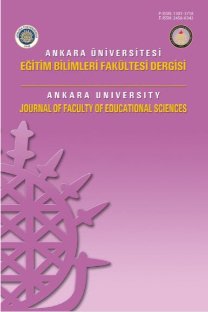Öfke Sorunu Ya ayan Çocuklara Yönelik Uygulamalar
___
- Block, J. (1978). Effects of rational-emotive mental health program on poorly achieving, disruptive high school students. Journal of Counseling Psychology,25, 61–65.
- Brody, M. (1974). The effects of rational-emotive affective education on anxiety, self-esteem, and frustration tolerance. Unpublished doctoral dissertation, Temple University, Philadelphia.
- Cangelosi, A., Gressard, C., & Mines, R. (1980). The effects of rational thinking groups on self-concepts in adolescents. The School Counselor, 14, 357–361.
- DeVoge, C. (1974). A behavioral approach to RET with children. Rational Living 9, 23–26.
- DiGiuseppe, R. (1975). A developmental study on the efficacy of rational-emotive education. Unpublished doctoral dissertation, Hofstra University.
- DiGiuseppe, R., & Kassinove, H. (1976). Effects of a rational-emotive school mental health program in children’s emotional adjustment. Journal of Community Psychology, 4, 382–387.
- Ellis, A. (1994). Reason and emotion in psychotherapy: Revised edition. Philadelphia: Citadel Press.
- Ellis, A., & Harper, R. (1975). The new guide to rational living. Los Angeles: Wilshire.
- Goldstein, A. (1994). Aggression towards persons or property in America’s schools. The chool Psychologist, 48, 6–16.
- Harris, S. (1976). Rational-emotive education and the human development program: A guidance study. Elementary School Guidance and Counseling, 10, 113–122.
- Katz, S. (1974). The effect of emotional education on locus of control and selfconcept. Unpublished doctoral dissertation, Hofstra University.
- Knaus, W., & Bokor, S. (1975). The effects of rational-emotive education on anxiety and self-concept. Rational Living, 10, 7–10.
- Knaus, W., & McKeever, C. (1977). Rational-emotive education on anxiety and self-concept. Journal of Rational Living, 10, 7–10.
- Maultsby, M., Knipping, P., & Carpenter, L. (1974). Teaching self-help in the classroom with rational self-counseling. Journal of School Health, 44, 445–448.
- Meichenbaum, D., & Goodman, J. (1971). Training impulsive children to talk to themselves. Journal of Abnormal Psychology, 77, 115–126.
- Meyer, D. (1981). Effects of rational-emotive therapy upon anxiety and selfesteem of learning disabled children. Ann Arbor: University of Michigan.
- Miller, N., & Kassinove, H. (1978). Effects of behavioral rehearsal, written homework, and level of intelligence on the efficacy of rational-emotive education in elementary school children. Journal of Community Psychology, 6, 366–373.
- Omizo, M., Lo, F., & William, R. (1986). Rational-emotive education, self-concept, and locus of control among learning disabled students. Journal of Humanistic Education and evelopment, 25, 59–69.
- Ritchie, B. (1978). The effects of rational-emotive education on irrational beliefs ssertiveness, and/or locus of control in fifth grade students. Unpublished doctoral issertation, Virginia Polytechnic University.
- Voelm, C. (1983). The efficacy of teaching rational-emotive education to actingout and ocially withdrawn adolescents. Unpublished doctoral dissertation, California School of rofessional Psychology.
- Von Pohl, R. (1982). A study to assess the effects of rational-emotive therapy with a selected group of emotionally disturbed children in day and residential treatment. Unpublished doctoral dissertation, University of Alabama, Birmingham.
- Wasserman T., & Vogrin D. (1979). Relationship of endorsement of rational beliefs, age, months treatment and intelligence to overt behavior of emotionally disturbed children. Psychological Reports, 44, 911–917.
- Warren, R., Deffenbacher, J., & Brading, P. (1976). Rational-emotive therapy and the eduction of test anxiety in elementary school students. Rational Living, 11, 28–29.
- Wilde, J. (1994). The effects of the let’s get rational board game on rational thinking, depression, and self-acceptance in adolescents. The Journal of Rational-Emotive and Cognitive-Behavior Therapy, 12, 189–196.
- Wilde, J. (1995). Anger management in schools: Alternatives to student violence.Lancaster, PA: Technomic Publishing Company.
- Wilde, J. (1996). Treating anger, anxiety, and depression in children and adolescents:
- A cognitive-behavioral perspective. Muncie, IN: Accelerated Development.
- Wilde, J. (1997a). The efficacy of short-term rational-emotive education with fourth grade students. Elementary School Guidance and Counseling, 31, 131–138.
- Wilde, J. (1997b). Hot stuff to help kids chill out: The anger management book. East Troy, WI: LGR Publishing.
- ISSN: 1301-3718
- Yayın Aralığı: 3
- Başlangıç: 1968
- Yayıncı: ANKARA ÜNİVERSİTESİ (EĞİTİM BİLİMLERİ FAKÜLTESİ)
Yeti Ekin E ğitimi Arattırmalarında Dünya Perspektifleri Montreal Uluslararası Seminer Raporu
Paul BÉLANGER, Madeleine BLAİS, Ahmet YILDIZ
Biyoloji Eğitimi Öğretmen Adaylarının Öğretiminde Öz-Yeterlik İnançları
Paralel, Eşdeğer ve Konjenerik Ölçmelerde Güvenirlik Katsayılarının Karşılaştırılması
Öfke Sorunu Ya ayan Çocuklara Yönelik Uygulamalar
Yeni İlköğretim Programları ve Öğretmenler
Anadolu ve Azerbaycan Türklerinin Çocuk Oyunlarının Karşılaştırılması
Yirmibirinci Yüzyılda Psikolojik Danışman
Yabancı Dil Öğretim Programlarında Kültürün Etkileri
Öfke: Kuramsal Yaklaşımlar ve Bireylerde Öfkenin Ortaya Çıkmasına Neden Olan Etmenler
